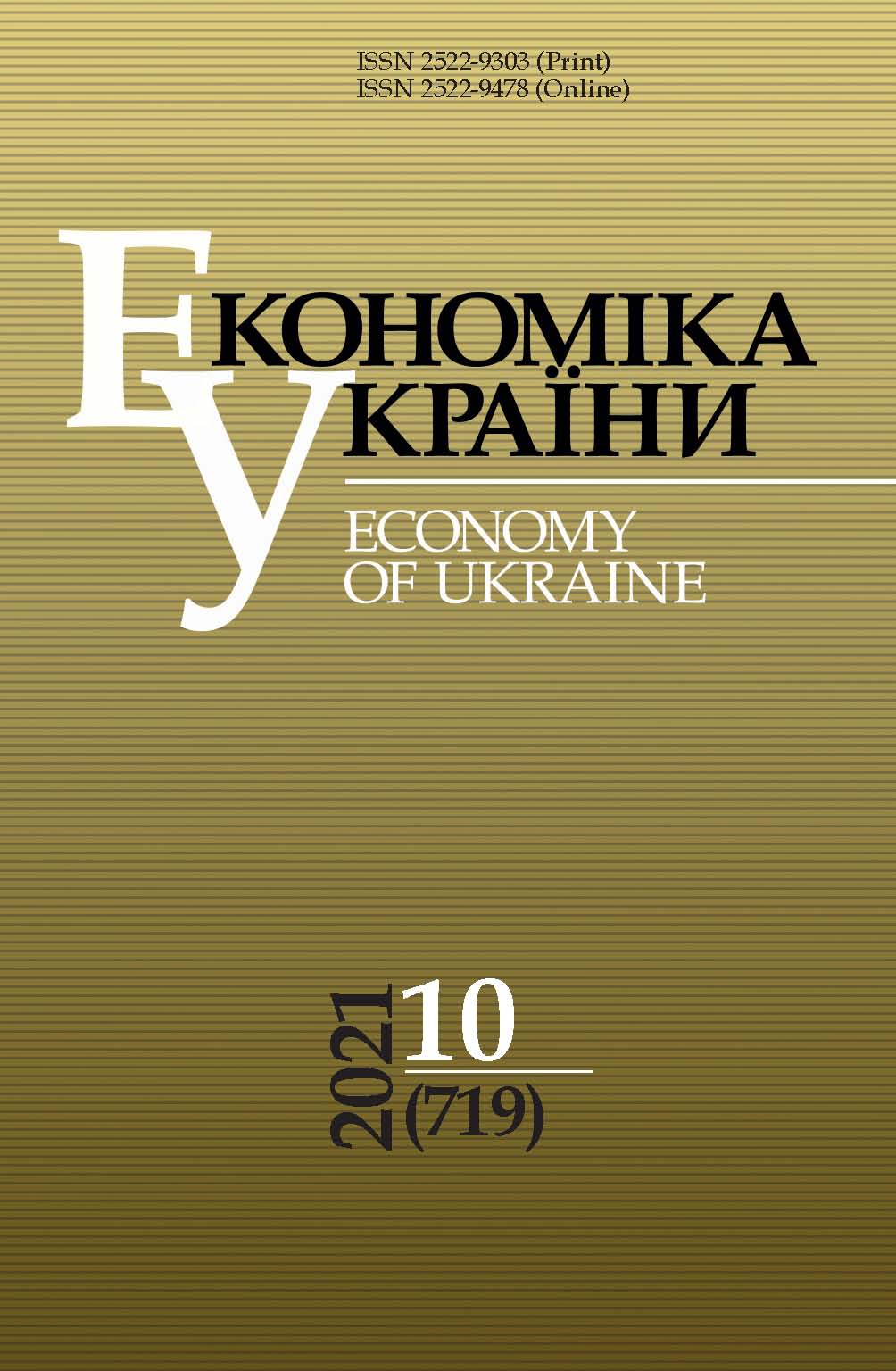CONDITIONS AND MECHANISMS FOR EFFECTIVE PREVENTION OF CORRUPTION IN UKRAINE
DOI:
https://doi.org/10.15407/economyukr.2021.10.067Keywords:
corruption; criminal economics; institute of corruption; subjects of corruption; object of corruption; bribe; mechanisms for overcoming corruption; declaration of income and property; legalization of shadow incomeAbstract
The content of systemic network structuring of corruption as an institution of absolute anti-social orientation is revealed. Attention is paid to the conceptual purity of the categorical apparatus, in particular, the concepts of “corruption” and “bribery” are distinguished. The characteristics of personalized and corporate-associated subjects of corruption are given, the content of modern forms and characteristic varieties of the object of corruption bribery is revealed. A differentiated list is given and the content of specific markets of “corruption services” operating within the general “black” market of Ukraine is revealed. The socio-economic origins are shown and the nature of personal and corporate interests of the subjects, the bearers of corruption relations, is revealed.
The real spectrum of destructive anti-social consequences of the synergy of the binary union of the “institution of corruption” with the “institution of the criminal “black” economy” is determined. There are three basic blocks of criminal economic activity: i) criminal trade; ii) provision of criminal services; iii) criminal violation of the rules of economic and commercial activity. On the basis of the generalized experience of the USA the necessary conditions are defined and suggestions are given concerning formation of organizational-economic and economic-legal anti-corruption mechanisms. It is proven that overcoming corruption is impossible without abolishing the legal principle of “presumption of innocence” in the field of confirming the legitimacy of taxpayers' incomes, who are obliged to provide comprehensive information proving the legitimacy of the sources of personal and family real estate.
The conditions for ensuring an effective order in the field of accounting and control of the completeness of citizens ’compliance with tax obligations on the basis of improving the mechanism of income declaration and state-market accounting of real estate of the population of Ukraine are determined. In the context of critical remarks on the mistakes made over the past five years, proposals are made to improve the organizational-economic framework for declaring annual income, as well as socially just and anti-corruption legalization of wealth, property and capital of individuals by providing fair compensation to the state treasury for losses caused to the budget during the period of independence of Ukraine.
References
Broadman H., Recanatini F. Corruption and Policy: Back to the Roots. World Bank, 2008, available at: web.worldbank.org/archive/website00818/WEB/PDF/WPS2368_.PDF [in Russian].
Zukoski J. When international business enters the fight against corruption. Finance.UA, April 29, 2013, available at: news.finance.ua/ua/news/-/301191/koly-v-borotbu-z-koruptsiyeyu-vstupaye-mizhnarodnyj-biznes [in Ukrainian].
Johannsen L., Pedersen K.H. Administrative corruption is associated with failed or unfinished economic reforms. Ukrainian Dialogue, November-December, 2015, pp. 85-89, available at: newukraineinstitute.org/media/news/593/file/Dialog_block.pdf [in Russian].
Kaufmann D. Corruption in the fog of ambiguity. Politics and Time, 1998, No. 1, pp. 36-42 [in Ukrainian].
Kirpichnikov A. Bribery and Corruption in Russia. Saint Petersburg, ALFA, 1997 [in Russian].
Kleiner V. Corruption in Russia, Russia Corrupted: Is There a Way out? Voprosy Ekonomiki, 2002, No. 6, pp. 81-96 [in Russian].
doi.org/10.32609/0042-8736-2014-6-81-96
Mark L., Georgyi S. Corruption in Russia: Classification and Dynamics. Voprosy Ekonomiki, 2012, No. 10, p. 7 [in Russian].
doi.org/10.32609/0042-8736-2012-10-4-29
Nisnevich Y., Stukal D. Multifaced Corruption and its Measurements in International Organizations' Studies. Mirovaya ekonomika i mezhdunarodnye otnosheniya, 2012, No. 3, pp. 83-90 [in Russian].
doi.org/10.20542/0131-2227-2012-3-83-90
Rose-Ackerman S. Corruption and Government: Causes, Consequences, and Reform. Moscow, Logos, 2003 [in Russian].
Satarov G. How to Measure and Control Corruption. Voprosy Ekonomiki, 2007, No. 1, pp. 4-10 [in Russian].
doi.org/10.32609/0042-8736-2007-1-4-10
Xueming S. The rationality of corruption in China. Politekonom, 1997, No. 1, pp. 92-103 [in Russian].
Arkusha L. Corruption and legalization (laundering) of proceeds from crime: Features of the ratio. South Ukrainian Law Journal, 2010, No. 3, pp. 153-155 [in Ukrainian].
Bezzub I. Anti-corruption policy in Ukraine, in: Information and Analytical Bulletin Based on Operational Materials. Supplement to the magazine "Ukraine: Events, Facts, Comments", 2015, No 10 (92), pp. 19-28 [in Ukrainian].
Bogatyrev I. Prevention of corruption as one of conditions of sustainable development of transitive society. Public Law, 2018, No. 1, pp. 17-23 [in Ukrainian].
Verstyuk S. Corruption: Definition, causes, impact on the economy. Economy of Ukraine, 2001, No. 3, pp. 66-74 [in Ukrainian].
Gumelyuk L. Theoretical and social analysis of corruption as a threat to the national security of Ukraine. Scientific Bulletin of Lviv State University of Internal Affairs, 2009, No. 2, pp. 1-10 [in Ukrainian].
Kamlyk M., Nevmerzhytskyi Ye. Corruption in Ukraine. Kyiv, Znannia, 1998 [in Ukrainian].
Korzh I. Political corruption and legal security of Ukraine. Law of Ukraine, 2009, No. 6, pp. 55-60 [in Ukrainian].
Melnyk M. Corruption: Essence, Concepts, Countermeasures, in: Economic Crimes: Prevention and the Fight Against Them. A. Komarova (Ed.). Kyiv, 2000, Vol. 25, pp. 27-115 [in Ukrainian].
Romaniuk B., Busol O. Legislation of Ukraine and Foreign Countries on Combating Corruption. International Experience in Combating Corruption. Kirovohrad, LLC "Poligraf-Servis", 2010 [in Ukrainian].
Voloshenko A. Anti-Corruption Dirigisme: State Regulatory Imperatives for Combating Systemic Corruption in Ukraine. Kyiv, Parliamentary Publishing House, 2018 [in Ukrainian].
Mandybura V. Corruption: institutional essence and mechanisms to overcome. Economic Theory, 2017, No. 1, pp. 59-76 [in Ukrainian].
doi.org/10.15407/etet2017.01.059
Mandybura V. "Shadow" Economy of Ukraine and Directions of Legislative Strategy of its Restriction. Kyiv, Parliamentary Publishing House, 1998 [in Ukrainian].
Mandybura V. Corruption: Institutional Essence and Mechanisms to Overcome. Kyiv, Parliamentary Publishing House, 2017 [in Ukrainian].
doi.org/10.15407/etet2017.01.059
Blandinierts J.-P. Ukrainian Econоmic Trends. Quarterly, December, 1999.
Downloads
Published
How to Cite
Issue
Section
License
Copyright (c) 2024 Economy of Ukraine

This work is licensed under a Creative Commons Attribution-NonCommercial-NoDerivatives 4.0 International License.



